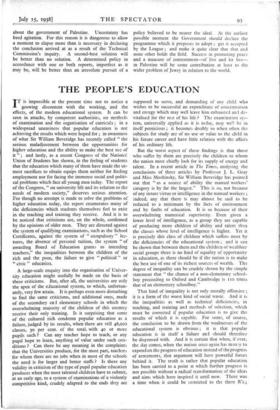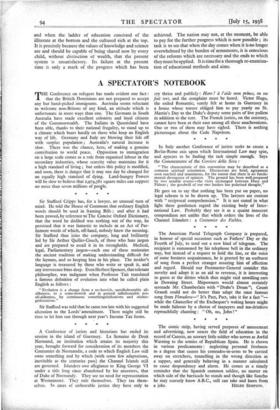THE PEOPLE'S EDUCATION IT is impossible at the present time
not to notice a .1- growing discontent with the working, and the effects, of the modern educational system. It can be seen in attacks, by competent authorities, on methods of examination and the organisation of curricula ; in a widespread uneasiness that popular education is not achieving the results which were hoped for ; in awareness of what Sir William Beveridge has recently called " the serious maladjustment between the opportunities for higher education and the ability to make the best use of it " ; and lastly, as a recent Congress of the National Union of Students has shown, in the feeling of students that the education which many of them have made the ut- most sacrifices to obtain equips them neither for finding employment nor for facing the immense social and politi- cal problems which face all young men today. The report of the Congress, " on university life and its relation to the needs of modern society," deserves serious attention. For though no attempt is made to solve the problems of higher education today, the report enumerates many of the deficiencies which students themselves feel to exist in the teaching and training they receive. And it is to be noticed that criticisms are, on the whole, confirmed by the opinions of older men. They are directed against the system of qualifying examinations, such as the School Certificates, against the system of " compulsory " lec- tures, the absence of personal tuition, the system " of awarding. Board of Education grants to intending teachers," the inequalities between the children of the rich and the poor, the failure to give " political " or " civic " education.
A large-scale enquiry into the organisation of Univer- sity. education might usefully be made on the basis of these criticisms. But, after all, the universities are only the apex of the educational system, to which, unfortun- ately, very few attain.. It is perhaps even more disturbing to find the same criticisms, and additional ones, made of the secondary and elementary schools in which the overwhelming majority of the children of this country receive their only training. Is it surprising that some of the cultured rich condemn popular education as a failure, judged by its results, when there are still 46,0oa classes, 30 per cent. of the total, with 4o or more pupils each ? Can any teacher hope to teach, or any pupil hope to learn, anything of value under such con- ditions ? Can there be any meaning in the complaints that the Universities produce, for the most part, teachers for whom there are no jobs when in most of the schools the need is for larger and better staffs ? Is there any validity in criticism of the type of pupil popular education produces when the most talented children have to submit, at an early age, to a system of examinations, of a violently competitive kind, crudely adapted to the ends they are supposed to serve, and demanding of any child who wishes to be successful an expenditure of concentration and energy which may well leave him exhausted and de- vitalised for the rest of his life ? The examination sys- tem, universally applied as it is today, may well be in itself pernicious ; it becomes doubly so when often the subjects for study are of no use or value to the child in his future career and have little relation with the affairs of his ordinary life.
But the worst aspect of these findings is that those who suffer by them are precisely the children to whom the nation most chiefly look for its supply of energy and talent. In a recent article in The Times, analysing the conclusions of three articles by Professor J. L. Gray and Miss Moshinsky, Sir William Beveridge has pointed out that " as a source of ability the manual workers' category is by far the largest." This is so, not because of any innate virtue or intelligence in the manual workers ; indeed, any that there is may almost be said to be reduced to a minimum by the facts of environment and by faults of education. It is so because of their overwhelming numerical superiority. Even given a lower level of intelligence, as a group they are capable of producing more children of ability and talent than the classes whose level of intelligence is higher. Yet it is precisely this class of children which suffers most by the deficiencies of the educational system ; and it can be shown that between them and the children of wealthier social groups there is no kind of equality of opportunity in education, as there should be if the nation is to make the best use of one of its richest sources of wealth. The degree of inequality can be crudely shown by the simple statement that " the chance of a non-elementary school- boy proceeding to Oxford and Cambridge is tto times that of an elementary schoolboy."
That kind of inequality is not only morally offensive ; it is a form of the worst kind of social waste. And it is the inequalities as well as technical deficiencies, in teaching, and training and methods of selection, which must be corrected if popular education is to give the results of which it is capable. For some, of course, the conclusion to be drawn from the weaknesses of the educational system is obvious ; it is that popular education is in itself a failure and should therefore be dispensed with. And it is certain that when, if ever, the day comes, when the nation once again has money to expend on the progress of education instead of the progress of armaments, that argument will have powerful forces behind it. The truth is rather that popular education has been carried to a point at which further progress is not possible without a radical transformation of the ideas and aims which have inspired it until now. There was a time when it could be restricted to the three R's; and when the ladder of education consisted of the illiterate at the bottom and the cultured rich at the top. It is precisely because the values of knowledge and science are and should be capable of being shared now by every child, without distinction of wealth, that the present system is unsatisfactory. Its failure at the present time is only a mark of the progress which has been achieved. The nation may not, at the moment, be able to pay for the further progress which is now possible ; its task is to see that when the day comes when it is no longer overwhelmed by the burden of armaments, it is conscious of the reforms which are necessary and the ends to which they must be applied. It is time for a thorough re-examina- tion of educational methods and aims.











































 Previous page
Previous page